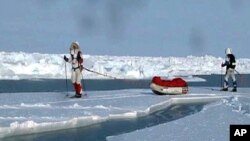As negotiators and world leaders head to Copenhagen for an international Climate Conference, there is new evidence of global warming in the Arctic. Two years ago, so much ice had melted that the Arctic Ocean sea route, known as the Northwest Passage, appeared free of ice on satellite imagery. A recent survey of Arctic ice, conducted by a sponsored team of explorers and scientists, found much more of it is melting during the Arctic summer than was previously thought - a finding that worries climate experts.
A journey that had never been done before. A 450-kilometer trek across the freezing cold Arctic for 73 days. Temperatures are 40 degrees centigrade below zero, and the terrain is unfriendly.
The purpose: to survey the ice in the Arctic, to find out how much of it is left, and how much is new. This is part of a collaborative effort by explorers, scientists and environmentalists, underwritten by the Catlin Group in cooperation with the World Wildlife Fund and other corporate sponsors. The expedition's aim was to raise awareness ahead of the Copenhagen Conference.
At a London news conference, they unveiled their findings.
Polar explorer Pen Hadow led the Catlin Arctic Survey expedition. "We'd been led to believe that we would encounter a good proportion of this older, thicker, technically multi-year ice that's been around for a few years and just gets thicker and thicker. We actually found there wasn't any multi-year ice at all," he stated.
Cambridge scientist Peter Wadhams, who has been studying the Arctic since 1971, says that means the decline is irreversible. "The more you lose, the more open water is created, the more warming goes on in that open water during the summer, the less ice forms in the winter, the more melt there is the following summer. It becomes a breakdown process where everything ends up accelerating until it's all gone," he said.
There was so little ice, that Hadow and his two companions were forced to swim across open patches of water. Arctic explorers in the future will need boats rather than sleds, says Hadow.
Duncan Wingham is head of Climate Science at University College London. He says the expedition revealed only a small snapshot of the Arctic.
"More important in helping us understand what's going on has been the satellite observations. Just simply because we see the whole picture, and the picture is one of ongoing decline," he said.
The evidence is so clear, he says, there is no room for debate. "Yes the science is in indeed to the extent that one has a certain sense of boredom about the question of whether it's happening or not, because it is," Wingham said. "And there are so many separate pieces of data that show this is true - the sea level is rising, the ice is melting, the ocean is heating and these are simply statements of fact."
The survey and satellite photos show the decline in the Arctic ice is faster than previously thought. Martin Summerkorn, the head of the World Wildlife Fund's arctic program, a partner in the survey, says that translates to more urgency to find a solution at the Copenhagen Conference.
"We have to basically achieve there the commitment to deal with the problem now. That's the minimum," he said. "We have to do that equitably, and we have to find a commitment that is quick."
The Arctic survey aims to raise awareness by taking along a camera and sharing the challenges of Arctic exploration via the Internet. The explorers' message from the top of the Earth is that global warming is happening, and they want world leaders to do something about it in Copenhagen.




